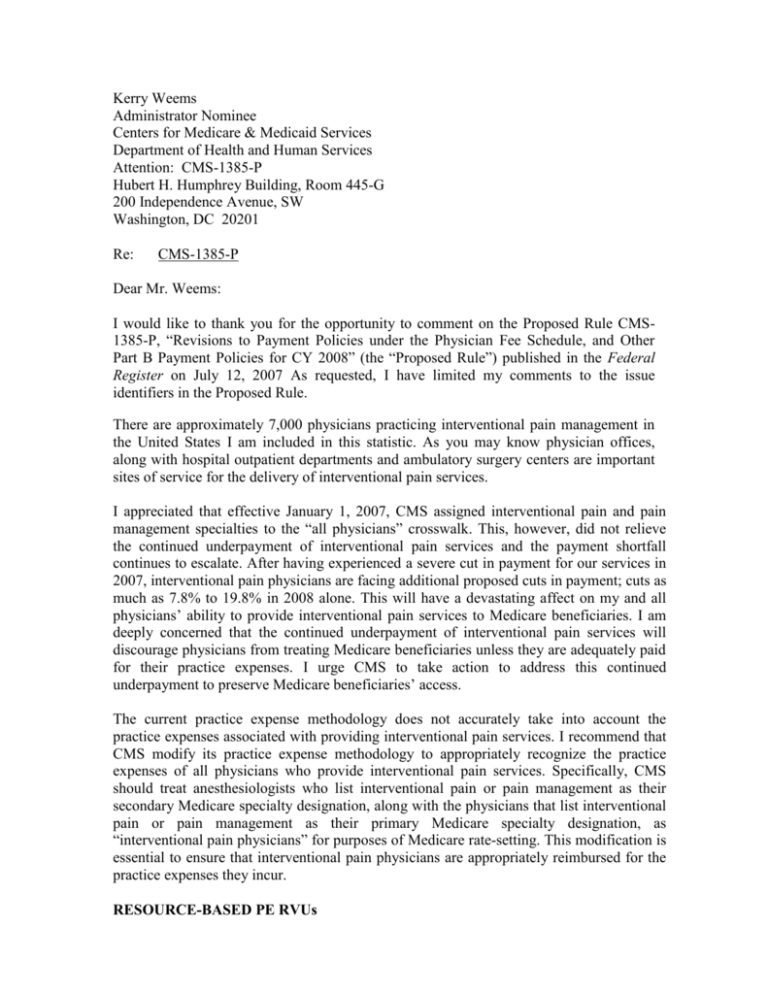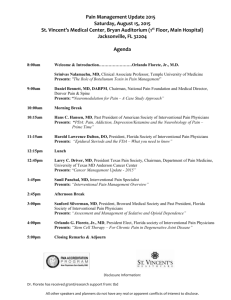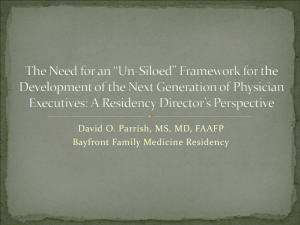STATEMENT ON NURSE ANESTHESIA TRAINING IN PAIN
advertisement

Kerry Weems Administrator Nominee Centers for Medicare & Medicaid Services Department of Health and Human Services Attention: CMS-1385-P Hubert H. Humphrey Building, Room 445-G 200 Independence Avenue, SW Washington, DC 20201 Re: CMS-1385-P Dear Mr. Weems: I would like to thank you for the opportunity to comment on the Proposed Rule CMS1385-P, “Revisions to Payment Policies under the Physician Fee Schedule, and Other Part B Payment Policies for CY 2008” (the “Proposed Rule”) published in the Federal Register on July 12, 2007 As requested, I have limited my comments to the issue identifiers in the Proposed Rule. There are approximately 7,000 physicians practicing interventional pain management in the United States I am included in this statistic. As you may know physician offices, along with hospital outpatient departments and ambulatory surgery centers are important sites of service for the delivery of interventional pain services. I appreciated that effective January 1, 2007, CMS assigned interventional pain and pain management specialties to the “all physicians” crosswalk. This, however, did not relieve the continued underpayment of interventional pain services and the payment shortfall continues to escalate. After having experienced a severe cut in payment for our services in 2007, interventional pain physicians are facing additional proposed cuts in payment; cuts as much as 7.8% to 19.8% in 2008 alone. This will have a devastating affect on my and all physicians’ ability to provide interventional pain services to Medicare beneficiaries. I am deeply concerned that the continued underpayment of interventional pain services will discourage physicians from treating Medicare beneficiaries unless they are adequately paid for their practice expenses. I urge CMS to take action to address this continued underpayment to preserve Medicare beneficiaries’ access. The current practice expense methodology does not accurately take into account the practice expenses associated with providing interventional pain services. I recommend that CMS modify its practice expense methodology to appropriately recognize the practice expenses of all physicians who provide interventional pain services. Specifically, CMS should treat anesthesiologists who list interventional pain or pain management as their secondary Medicare specialty designation, along with the physicians that list interventional pain or pain management as their primary Medicare specialty designation, as “interventional pain physicians” for purposes of Medicare rate-setting. This modification is essential to ensure that interventional pain physicians are appropriately reimbursed for the practice expenses they incur. RESOURCE-BASED PE RVUs I. CMS should treat anesthesiologists who have listed interventional pain or pain management as their secondary specialty designation on their Medicare enrollment forms as interventional pain physicians for purposes of Medicare rate-setting. Effective January 1, 2007, interventional pain physicians (09) and pain management physicians (72) are cross-walked to “all physicians” for practice expenses. This crosswalk more appropriately reflects the indirect practice expenses incurred by interventional physicians who are office-based physicians. The positive affect of this cross-walk was not realized because many interventional pain physicians report anesthesiology as their Medicare primary specialty and low utilization rates attributable to the interventional pain and pain management physician specialties. The practice expense methodology calculates an allocable portion of indirect practice expenses for interventional pain procedures based on the weighted averages of the specialties that furnish these services. This methodology, however, undervalues interventional pain services because the Medicare specialty designation for many of the physicians providing interventional pain services is anesthesiology. Interventional pain is an inter-disciplinary practice that draws on various medical specialties of anesthesiology, neurology, medicine & rehabilitation, and psychiatry to diagnose and manage acute and chronic pain. Many interventional pain physicians received their medical training as anesthesiologists and, accordingly, clinically view themselves as anesthesiologists. While this may be appropriate from a clinically training perspective, their Medicare designation does not accurately reflect their actual physician practice and associated costs and expenses of providing interventional pain services. This disconnect between the Medicare specialty and their practice expenses is made worse by the fact that anesthesiologists have the lowest practice expense of any specialty. Most anesthesiologists are hospital based and do not generally maintain an office for the purposes of rendering patient care. Interventional pain physicians are office based physicians who not only furnish evaluation and management (E/M) services but also perform a wide variety of interventional procedures such as nerve blocks, epidurals, intradiscal therapies, implant stimulators and infusion pumps, and therefore have practice expenses that are similar to other physicians who perform both E/M services and surgical procedures in their offices. Furthermore, the utilization rates for interventional pain and pain management specialties are so low that they are excluded from Medicare rate-setting or have very minimal affect compared to the high utilization rates of anesthesiologists. CMS utilization files for calendar year 2007 overwhelming report anesthesiologists compared to interventional pain physicians and pain management physicians as being the primary specialty performing interventional pain procedures. The following table illustrates that anesthesiologists are reported as the primary specialty providing interventional pain services compared to interventional pain physicians CPT Code Anesthesiologists 05 Interventional Pain Management Physicians (Non-Facility) 64483 (Inj foramen epidural l/s) 64520 (N block, lumbar/thoracic) 64479 (Inj foramen epidural c/t) 62311 (Inject spine l/s (cd)) 59% 68% 58% 78% - 09 (Non-Facility) 18% 15% 21% 8% The high utilization rates of anesthesiologists (and their extremely low practice expenses) drive the payment rate for the interventional pain procedures, which does not accurately reflect the resource utilization associated with these services. This results in payment rates that are contrary to the intent of the Medicare system—physician payment reflects resources used in furnishing items and services to Medicare beneficiaries. I urge CMS to make a modification to its practice expense methodology as it pertains to interventional pain services such that its methodology treats physicians who list anesthesiology as their primary specialty and list interventional pain as their secondary specialty designation as interventional pain physicians for rate-setting. This pool of physicians should be cross-walked to “all physicians” for practice expenses. This will result in a payment for interventional pain services that is more aligned with the resources and costs expended to provide these services to a complex patient population. I urge CMS not to delay implementing our proposed recommendation to see if the updated practice expenses information from the Physician Practice Information Survey (“Physician Practice Survey”) will alleviate the payment disparity. While I believe the Physician Practice Survey is critical to ensuring that physician services are appropriately paid, I do not believe that updated practice expense data will completely resolve the current underpayment for interventional pain services. The accurate practice expense information for interventional pain physicians will continue to be diluted by the high utilization rates and associated low practice expenses of anesthesiologists. II. CMS Should Develop a National Policy on Compounded Medications Used in Spinal Drug Delivery Systems We urge CMS to take immediate steps to develop a national policy as we fear that many physicians who are facing financial hardship will stop accepting new Medicare beneficiaries who need complex, compounded medications to alleviate their acute and chronic pain. Compounded drugs used by interventional pain physicians are substantially different from compounded inhalation drugs. Interventional pain physicians frequently use compounded medications to manage acute and chronic pain when a prescription for a customized compounded medication is required for a particular patient or when the prescription requires a medication in a form that is not commercially available. Physicians who use compounded medications order the medication from a compounding pharmacy. These medications typically require one or more drugs to be mixed or reconstituted by a compounding pharmacist outside of the physician office in concentrations that are not commercially available (e.g., concentrations that are higher than what is commercially available or multi-drug therapy that is not commercially available). The compounding pharmacy bills the physician a charge for the compounded fee and the physician is responsible for paying the pharmacy. The pharmacy charge includes the acquisition cost for the drug ingredients, compounding fees, and shipping and handling costs for delivery to the physician office. A significant cost to the physician is the compounding fees, not the cost of drug ingredient. The pharmacy compounding fees cover re-packaging costs, overhead costs associated with compliance with stringent statutes and regulations, and wages and salaries for specially trained and licensed compounding pharmacists bourn by the compounding pharmacies. The physician administers the compounded medication to the patient during an office visit and seeks payment for the compounded medication from his/her carrier. In many instances, the payment does not even cover the total out of pocket expenses incurred by the physician (e.g., the pharmacy fee charged to the physician). There is no uniform national payment policy for compounded drugs. Rather, carriers have discretion on how to pay for compounded drugs. This has lead to a variety of payment methodologies and inconsistent payment for the same combination of medications administered in different states. A physician located in Texas who provides a compounded medication consisting of 20 mg of Morphine, 6 of mg Bupivicaine and 4 of mg Baclofen may receive a payment of $200 while a physician located in Washington may be paid a fraction of that amount for the exact same compounded medication. In many instances, the payment to the physician fails to adequately cover the cost of the drug, such as the pharmacy compounded fees and shipping and handling. Furthermore, the claim submission and coding requirements vary significantly across the country and many physician experience long delays in payment. We urge CMS to adopt a national compounded drug policy for drugs used in spinal delivery systems by interventional pain physicians. Medicare has the authority to develop a separate payment methodology for compounded drugs. The Medicare Prescription Drug, Improvement and Modernization Act of 2003 (the “MMA”) mandated CMS to pay providers 106% of the manufacturer’s Average Sales Price (“ASP”) for those drugs that are separately payable under Part B. The language makes clear that this pricing methodology applies only to the sale prices of manufacturers. Pharmacies that compound drugs are not manufacturers, and Congress never contemplated the application of ASP to specific drug compounds created by pharmacies. Accordingly, CMS has the discretion to develop a national payment policy. We believe that an appropriate national payment policy must take into account all the pharmacy costs for which the physicians are charged: the cost of the drug ingredient, the compounding fee costs, and the shipping and handling costs. We stand ready to meet with CMS and its staff to discuss implementing a national payment policy. III. CMS Should Incorporate the Updated Practice Expenses Data from Physician Practice Survey in Future Rule-Making I commend CMS for working with the AMA, specialty societies, and other health care professional organizations on the development of the Physician Practice Survey. I believe that the survey data will be essential to ensuring that CMS has the most accurate and complete information upon which to base payment for interventional pain services. I urge CMS to take the appropriate steps and measures necessary to incorporate the updated practice expense data into its payment methodology as soon as it becomes available. IV CMS Should Work Collaboratively with Congress to Fix the SGR Formula so that Patient Access will be preserved. The sustainable growth rate (“SGR”) formula is expected to cause a five percent cut in reimbursement for physician services effective January 1, 2008. Providers simply cannot continue to bear these reductions when the cost of providing healthcare services continues to escalate well beyond current reimbursement rates. Continuing reimbursement cuts are projected to total 40% by 2015 even though practice expenses are likely to increase by more than 20% over the same period. The reimbursement rates have not kept up with the rising cost of healthcare because the SRG formula is tied to the gross domestic product that bears no relationship to the cost of providing healthcare services or patient health needs. Because of the flawed formula, physicians and other practitioners disproportionately bear the cost of providing health care to Medicare beneficiaries. Accordingly, many physicians face clear financial hardship and will have to make painful choices as to whether they should continue to practice medicine and/or care for Medicare beneficiaries. CMS should work collaboratively with Congress to create a formula that bases updates on the true cost of providing healthcare services to Medicare beneficiaries. *** Thank you for the opportunity to comment on the Proposed Rule. My fear is that unless CMS addresses the underpayment for interventional pain services today there is a risk that Medicare beneficiaries will be unfairly lose access to interventional pain physicians who have received the specialized training necessary to safely and effectively treat and manage their complex acute and chronic pain. We strongly recommend that CMS make an adjustment in its payment methodology so that physicians providing interventional pain services are appropriately and fairly paid for providing these services and in doing so preserve patient access. Sincerely, Your Name Address City, State Zip






